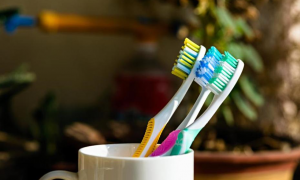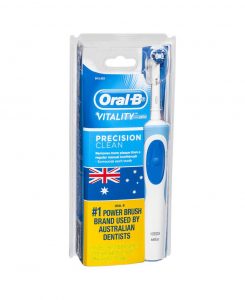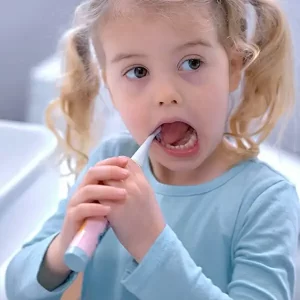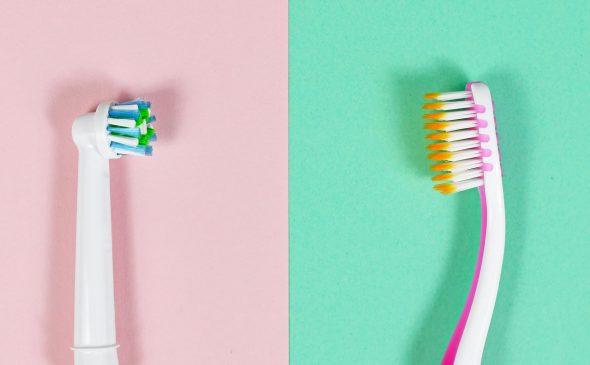CHOOSING A TOOTHBRUSH – Electric or Manual?
Due to their detailed cleaning, many professionals recommend electric toothbrushes for use on braces. When you have your braces at ONiA, you will receive an Oral B Vitality electric toothbrush!
It’s an issue that can cause a lot of debate, but are electric toothbrushes really more effective than a manual toothbrush when it comes to cleaning and taking care of your pearly whites? We take a look at the key differences, and whether you really need to fork out for that sparkly new electric brush.
MANUAL TOOTHBRUSHES
One of the main benefits of manual toothbrushes is that there’s a wider variety of options. You can get large, medium or small toothbrush heads, as well as a handy tool on the back of the head to help keep your tongue clean. Manual toothbrushes can help you feel like you’ve got more control over the brushing process, including how hard the pressure is on their teeth. This can be particularly helpful for people with sensitive teeth and gums, who are able to respond to twinges of discomfort by applying less pressure.
Manual toothbrushes are also significantly cheaper than electric toothbrushes, making them much easier to replace. As they’re smaller, they also pack more easily when you’re travelling, so you never have to go a night without ensuring your teeth are sparkling clean!
ELECTRIC TOOTHBRUSHES
One of the main benefits of electric toothbrush is that they do a lot of the work for you, with a power rotation that helps to loosen plaque. This can be a huge benefit for people with arthritis or other conditions which limit dexterity. The range of variable speeds can also be helpful for people with sensitive teeth and gums, and some of the higher-range electric toothbrushes even have a warning light that acts as an alert if too much pressure is being applied.
Electric toothbrushes are often great for kids who are reluctant to brush their teeth, as electric toothbrushes can seem more fun for them to use. Many electric toothbrushes also include an in-built timer to make sure you’re brushing your teeth for at least two minutes, and give guidance about where in your mouth you should be brushing, to help ensure you brush all four quadrants of your mouth.
How often should you change your toothbrush?
With both electric and manual toothbrushes, you should look to change your toothbrush or brush head every three months. If you’re currently undergoing orthodontic treatment, you’ll need to change your toothbrush more regularly, around every six to eight weeks.
What is the best toothbrush for braces?
Due to their detailed cleaning, many professionals recommend electric toothbrushes for use on braces. When you have your braces at ONiA, you will receive an Oral B Vitality electric toothbrush!
How to brush braces with an electric toothbrush
When brushing braces with a sonic or oscillating electric toothbrush, ensure the bristles surround the brackets, but always be careful — undue pressure can damage the brackets. Be sure to slow down and brush each tooth individually, and your smile will stay sparkling.
Can you clean your tongue with an electric toothbrush
You can clean your tongue with an electric toothbrush much the same as you would with a manual one. Many brushes will have a gum care or massage mode, if yours has a similar setting then it’s best to use it.. Depending on the style of electric brush, you may find it more comfortable to brush with small concentric circles. Ensure you cover all of the tongue, and rinse afterwards.
Can electric toothbrushes cause gum recession?
If you don’t use your electric toothbrush correctly, you can cause harm to your gums. Being too rough with the brush can cause your gums to recede, opening up more area for bacteria to reach the bone below. It’s very important to be gentle. A sign that you’re not being delicate enough could be that you’re replacing your brush too often. If you’re find that you replace your toothbrush head more than once every three months, you likely need to ease up.
Can kids use electric toothbrushes?
When kids first start being responsible for brushing their own teeth, a manual toothbrush can be a better option, as they are lighter and more easy for a child to control.

However, as kids get older an electric toothbrush designed especially for children might be a more suitable option. Not only can it be easier for them to handle and manoeuvre, but the in-built controls time their brushing sessions and can encourage good oral hygiene behaviours. Furthermore, some kids enjoy using an electric toothbrush much more, which makes the ritual more engaging for them.







